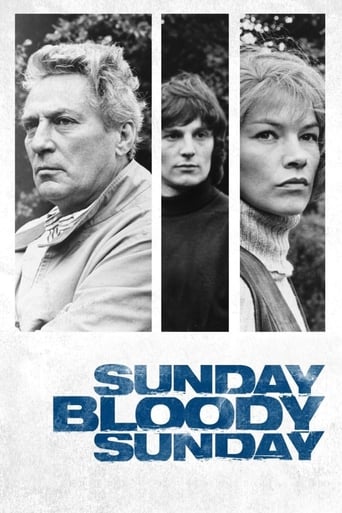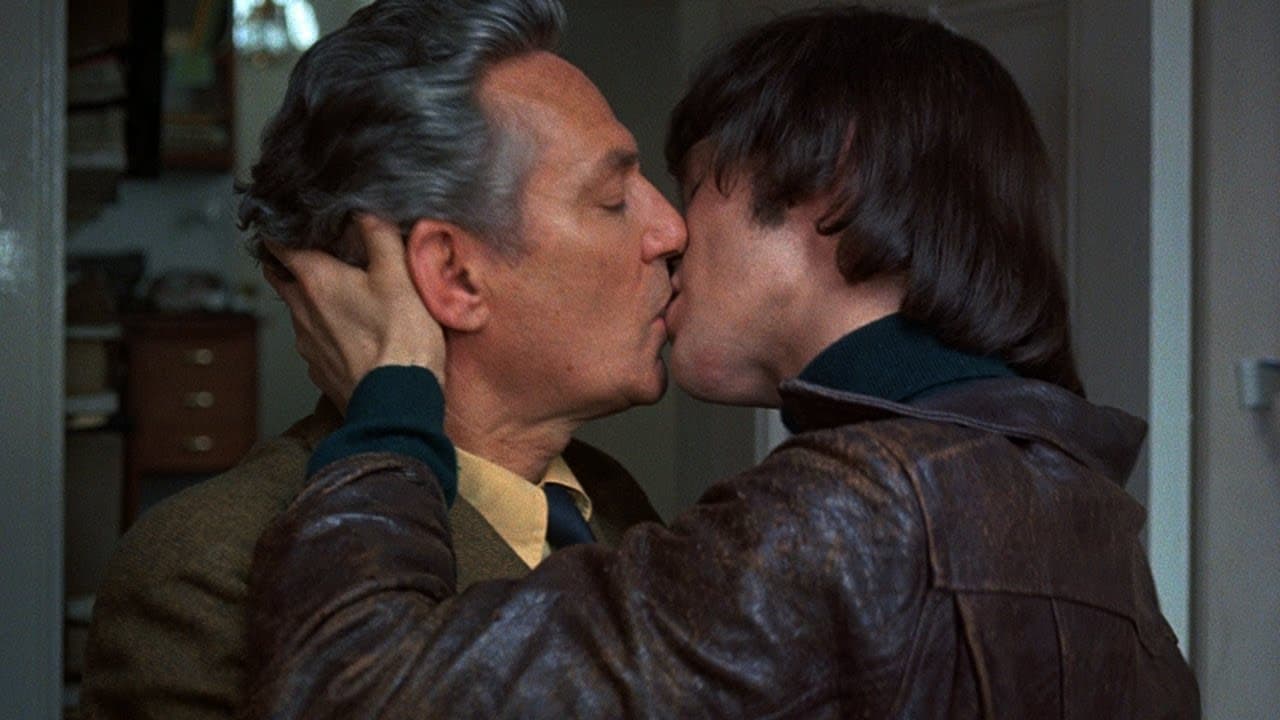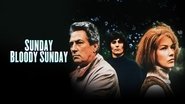Charles Camp
A pretty interesting film. This isn't one of those movies that's especially thrilling to watch (although there is some very nice camera-work and editing to enjoy). Rather, it's the kind of film that tends to linger in the mind specifically because of its restraint: the lack of overt drama or punchy climax forces you to think back on the moments and scenes that may have seemed insignificant while you were watching them but, in fact, were the lifeblood of the story.A lot of reactions to this film paint it as being very "grown-up" - with mature adults that, in the end, make mature decisions about their relationships. I definitely agree that it is quite "grown-up" in its very frank, non-dramatized depiction of sexuality and its fluidity (especially impressive given how long ago it was made). However, the characters themselves and their actions in the film are a different story. To me, the movie seems to be more about emotionally damaged/compromised individuals and their clinging to an awful relationship simply because they're desperate for some love. Any love.This is easy to see with Alex's character. She's a divorcée and throughout the film it is quite clear that she is pained by the separation. She often comes off as being troubled and outwardly unsure of herself - she openly cries, gazes at old photos of her and her ex- husband, absently knocks things over in her house etc. It's easy to understand why she so desperately clings to her relationship with Bob - she's lonely and yearns for closeness and romance.So much so, in fact, that she is willing to share Bob with his other lover, Dr. Daniel Hirsh. The brilliant key of the film is that all three individuals know they are in a love triangle. There's no secret affairs that culminate in an explosive finale where all is revealed - everyone involved knows exactly what is going on and run with it anyway. Bob is no mystery; he's a young, free-spirited and fickle guy who refuses to be tied down and is having fun exploring his sexuality. He doesn't seem to deeply care about either Daniel or Alex, and is ready to up and leave them for a move to NYC without so much as a second thought. Alex, however, is so desperate for love that she clings to this young, immature boy and is even willing to accept the fact that she has to share him with someone else.Daniel's disposition is much more subtle and potentially more difficult to pin down. However, it seems to me like the emotional turmoil that Alex outwardly expresses is the same turmoil that plagues Daniel as well - he's just better at concealing it. Perhaps being gay myself gives me a bit of an advantage as I can more easily understand and relate to Daniel (and how the director, who is also gay, wanted to portray his character and the complex emotions that go along with having an atypical sexuality or gender identity). He is outwardly a very well put-together man. He is a successful doctor, well-dressed and well-spoken. However, evidence of his less-than-healthy emotional state appears throughout the film. Simply the fact that a successful and respected doctor would entertain a relationship with an immature young man who is, at best, half-interested in him is proof enough that something is wrong. Like Alex, he too is clinging to this relationship, desperate for closeness and love. The complex emotions that come along with being gay are also portrayed very well and subtly. Daniel seems to be "out" and comfortable around his friends and seems at ease with himself when he is around Bob. But there are other moments in the film that suggest another side; he becomes very embarrassed when he is noticed in public by a former hookup, and during a Bar Mitzvah towards the end the film it becomes clear that he has not come out to his extended family, awkwardly skirting their attempts at setting him up with women. The film really nails the conflicting and confusing emotions that can come along with being gay, and how they manifest themselves in different situations. The end result is a man who is emotionally strained just like Alex, and who clings to this farce of a relationship in the same way she does.I appreciated too that the film doesn't take a side or judge these characters for their actions. Alex ultimately decides that this is not right and she needs to move on with her life and find a true partner. Daniel, on the other hand (and in a surprising, fourth-wall breaking final scene) insists on staying in the relationship because it does bring him some happiness - and he would rather have something than nothing at all. The film doesn't cast either of their decisions in a negative or positive light, smartly leaving it to the viewer to decide for themselves.
boyan-denizov
A portrait of the turbulent 60s in Britain. It is interesting how norms have changed since then. There is much drinking and smoking in the film, including a scene where little children smoke--unimaginable to be shot now. On the other hand: the mouth-to-mouth kiss between the two men must have looked extremely shocking to the audiences then while today it would not be paid attention to. Lifestyles and norms change with times. The film is rather chaotic and this is something that I did not like about it. ( Maybe it is true to its time--the 60s were VERY chaotic as we all know). There are scenes with great subtlety and sensitivity and other unnecessary scenes which are banal and uninteresting and do not have anything to do with the plot. What I miss is the tragic perception of the characters' problems. The first half of the film feels like a comedy while in the second part it changes more and more into tragedy of loneliness and loss. This is somewhat confusing. I wish the film emphasized this loneliness and loss of the main two characters more. Of all the actors I liked Glenda Jackson most. She is a very good dramatic actress and it is because of her acting that these tragic tones are introduced in the film. Also she is a very beautiful woman with a typically English appearance. Peter Finch is less plausible and sometimes he acts in a comic way which I think is inappropriate. Also I did not like his last monologue turning towards the viewers--it spoils the magic of art. Actors should never notice the audience until the film finishes--this is what I mean. Also the title of the film has not been explained at all. Why is the Sunday bloody? I could not understand. And the whole story goes through the week, not only on Sunday. So, the title is misleading. I liked, however, the themes that this film presented: America as the land of promise for the young, aging and the reduction of the expectations you have in life, sexual promiscuity in these times that inevitably was leading to jealousy even though the characters pretend that they have overcome it ( which they haven't of course). All in all, an interesting film despite its flaws but definitely not a masterpiece!
ricbigi
I saw Sunday,BLOODY Sunday when it came out and own it in DVD format. Being born in 1949, I feel totally in touch with this story, its characters, and the superb way John Schlesinger translated it into film. I have seldom seen such a deep, adult treatment of human relationships. SBS is particularly sensitive to the smallest details of what it means to live and love in our times. The Penelope Gilliatt screenplay is so masterful in showing the many aspects of the personal universe of each character that every emotion is perfectly rendered, balancing dark and light moments in just the right way. Peter Finch, Glenda Jackson,Peggy Ashcroft and Bessie Love are a joy to watch, to say nothing of the other actors, all splendid. I treasure this film.
robertconnor
As the 1960s become the 1970s in London, England, a successful male doctor and divorced, female recruitment consultant both try to maintain a relationship with a self-centred younger man.Fascinating period piece, exploring the reality of the late sixties 'free love' ideal - she loves Bob, he love Bob, Bob loves... well, nothing substantial, as it turns out. Mixing in ghastly 'of their time' friends (ex-hippie-types Alva and Bill and their dreadful kids), Sunday, Bloody Sunday is at once both dated and contemporary - set in a time of economic chaos and dealing with a taboo which, in 2009, still seems at least unsettling. Jackson and Finch are brilliant, apologetically yet furiously settling for all the crumbs they can get from their cool younger lover, although under Schlesinger's direction, Head is much less successful - whilst he captures Bob's egotistical nature, there's no counter-balance of charm, leaving the viewer wondering exactly what is either Alex or Daniel really see in him.Ground-breaking story-telling then, and all kudos to Gilliatt, Sherwin, Janni, Schlesinger and Peter Finch for bringing this grown-up picture of early 70s contemporary life to the screen.



 AD
AD





